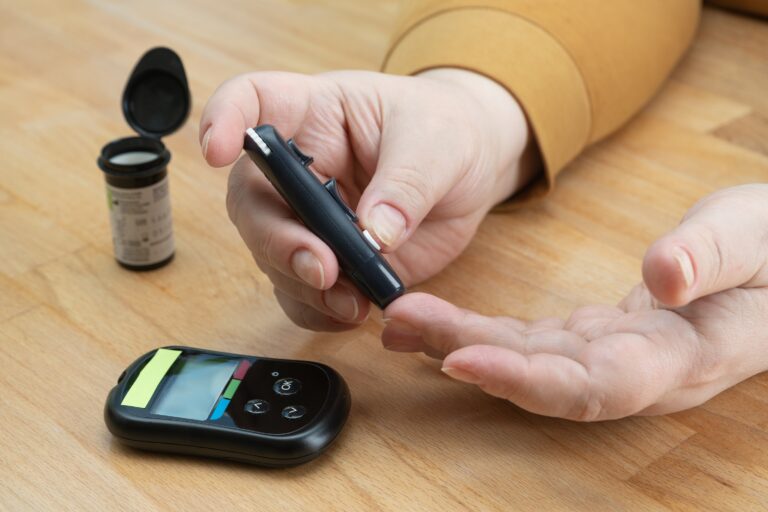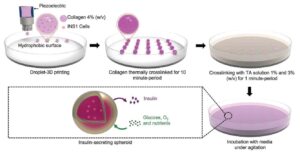Researchers led by Javier Ramón from BLOC project, in collaboration with IDIBAPS research center in Barcelona, have developed nontoxic small spheres able to respond to variations in glucose levels, and producing insulin in vitro. These biomimetic spheroids containing pancreatic β-cells were prepared based on 3D bioprinting. This approach might help in the future improving clinical outcomes of β-cell transplantation strategies for diabetes treatment, as well as for in vitro drug screening platforms.

Diabetes Mellitus is a metabolic disease characterized by a failure in the production of insulin by the β-cells in the pancreas, the hormone responsible to regulate glucose levels in the blood. In 2019, according to the World Health Organization, diabetes caused the death of 1.5 million people worldwide, and nowadays, there are more than 420 million people affected by this disease.
In type 1 diabetes (T1DM), an autoimmune disease, a type of cells called β-cells and found in the pancreatic islets, are destroyed by the immune system, avoiding the production of insulin. The most extended treatment in this case is the regular injection of insulin by the patients, throughout all their lives, to control the persistent high glucose levels in the blood. However, as this therapy does not simulate the real time secretion of insulin by the β-cells, it ends by causing severe chronic complications, as cardiovascular diseases and nephropathy.
A promising alternative therapy against T1DM is the transplantation of pancreatic islets containing β-cells to the patients. Unfortunately, it cannot be currently applied in the clinic due to complications as the poor oxygenation and vascularization of the cells, that highly limit their retention following implantation.
To overcome these obstacles, Javier Ramón, BLOC researcher at Institute for Bioengineering of Catalonia (IBEC), led a work in collaboration with researchers from IDIBAPS, to develop a high-throughput methodology applying 3D bioprinting to encapsulate β-cells inside collagen-tannic acid spheroids. This innovative strategy can increase the success of pancreatic islet transplantation and has been recently published in the Advanced Materials Technologies Journal.
3D bioprinted spheroids containing β-cells produce insulin in vitro
One strategy to increase β-cells retention after transplantation is to use protective semipermeable biomaterials to encapsulate the cells. These engineered tissues, known as spheroids or encapsulated-based microspheres, provide biocompatible properties that confer a more effective cell attachment, thus reducing cell loss, and acts as a physical protective barrier against the patient’s immune system.

The new approach proposed by IBEC researchers employs 3D bioprinting technology to develop collagen spheroids crosslinked with tannic acid, in an attempt to mimic the extracellular matrix microenvironment of in vivo β-cells. Crosslinking with tannic acid prevents collagenase degradation, enhances spherical structural consistency, and allows customization of microsphere diameter with extremely low variability
To validate the new strategy, researchers prepared 3D collagen-based microcapsules crosslinked with tannic acid containing rat insulinoma cells. They observed that the spheroids maintained cell viability and metabolic activity up to 30 days, reflecting a correct diffusion of oxygen and nutrients. Also, the tannic acid crosslinking strategy improved the retention of β-cells inside the spheroids.
“Our high-throughput approach facilitates the fabrication of a cell encapsulation system that ensures good survival and functionality of insulin-producing β-cells in a glucose-based manner”
This novel 3D bioprinting procedure allows the fabrication of a large number of microspheres capable to respond to glucose by secreting insulin and can be helpful for advanced functional studies aiming β-cell transplantation for diabetes treatment. Additionally, this technology can open new avenues and be applied to encapsulate a wide range of transplantable cell types.
Reference article: Laura Clua-Ferré, Francesco de Chiara, Júlia Rodríguez-Comas, Jordi Comelles, Elena Martinez, Amelie Luise Godeau, Ainhoa García-Alamán, Rosa Gasa, and Javier Ramón-Azcón. Collagen-Tannic Acid Spheroids for β-Cell Encapsulation Fabricated Using a 3D Bioprinter. Adv. Mater. Technol. 2022, 2101696.